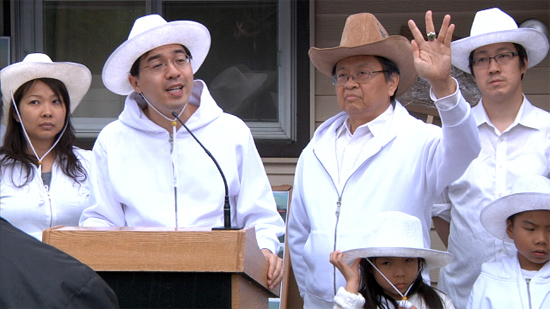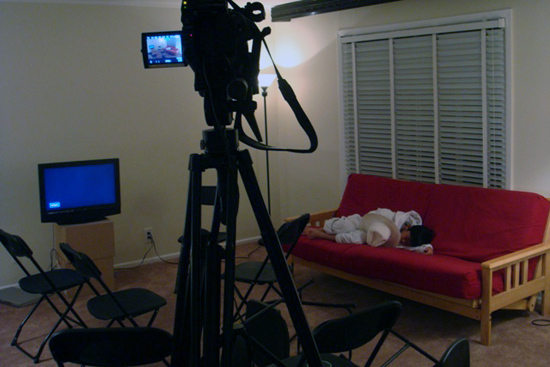Film festivals must do more these days than just bring films to the public. The filmmakers need far more support than just that if they are going to be able to sustain a life of making ambitious and diverse work. Fortunately SOME festivals are doing something to help. The Lone Star International Film Festival is one, and so when they asked me to help, I agreed, as did some other truly brave thinkers in the field.
Read their press release below…
Lone Star International Film Festival in Fort Worth’s Sundance Square Announces 2011 Distribution Forum
FORT WORTH, Texas – Oct. 11, 2011 – The Lone Star Film Society (LSFS) announces members of the distribution forum that will offer their insight and expertise at the 2011 Lone Star International Film Festival Fort Worth in Sundance Square Nov. 9 – 13.
Filmmakers accepted into the exclusive LSIFF Feature Film Competition program will have the opportunity to receive one-on-one mentorship from these leading industry professionals who specialize in new methods of film distribution and marketing. Group discussions will also be organized and a report on the forum’s activities and findings will be published following the festival.
“This new element of the festival furthers our mission to support filmmakers and the film industry. As part of an ongoing effort to foster stability and sustainability in independent film, we intend to further the development of best practices for filmmakers working primarily with new methods of distribution and marketing,” Alec Jhangiani, Lone Star Director, said.
This year’s forum will include one public session on Friday, November 11 at Texas Christian University. The panel will discuss the films included in the competition as well as take questions from the audience. Please visit the website www.lonestarfilmsociety.com for time and other details of the public discussion.
Members of the 2011 Lone Star Distribution Forum will include:
Joshua Green, VP, Distribution, Emerging Pictures (EP) – EP has a network of arts institutions, media arts centers and independent art house theaters tied together through digital technology that enables them all to cost effectively exhibit art films, independent cinema and cultural programming. Green is responsible for securing new exhibition venues for Emerging’s digital cinema network and managing marketing efforts for the network. He also associate produced Sona Jain’s For Real and Ann Hu’s Beauty Remains. He recently executive produced Kief Davidson’s acclaimed IFC Films documentary Kassim the Dream released in 2009 and is currently executive producing documentaries on the rock band Journey, rap pioneers, the Sugarhill Gang, and filmmaking icon Sidney Lumet, all set to release in 2012. He holds an MBA from Columbia Business School and an undergraduate degree from Cornell University.
Dana Harris, Editor-in-Chief and general manager, indieWIRE (iW) – Prior to joining iW, Harris spent nearly 11 years at Variety in roles that included film reporter, creating lifestyle section Variety Weekend, serving as editor of Variety.com and developing new products for the publication’s website. She was also the managing editor for the Independent Film and Video Monthly and a film reporter at the Hollywood Reporter. She has covered virtually all of the world’s major film festivals, contributed to publications that include the Los Angeles Times Magazine, the Star-Ledger, the UTNE Reader, FILMMAKER and Premiere and has participated as a moderator and panelist at festivals and conferences including the Toronto International Film Festival, New York Film Festival, SXSW and the International Documentary Association, among others.
Eugene Hernandez, Director of Digital Strategy at Film Society of Lincoln Center – Eugene co-founded indieWIRE and served as the Editor-in-Chief. Eugene served as an instructor at The New School in Manhattan and participated as a juror and panelist at international film festivals including Sundance, the International Documentary Film Festival Amsterdam, the San Francisco International Film Festival, the Tribeca Film Festival and many others. As a reporter he has contributed to The Wall Street Journal Online, Variety, Screen International, FILMMAKER Magazine and The Hollywood Reporter. Additionally, Eugene spent 5 years at ABC-TV, ultimately working in its emerging Multimedia division as a producer of websites for ABC News and the annual Academy Awards.
Ted Hope, Producer, 21 Grams, American Splendor, Happiness, The Ice Storm, In the Bedroom — Ted Hope, co-founder of Good Machine, This is that and, most recently, Double Hope Films, has produced over sixty films, including three Sundance Grand Prize winners and the first features of Alan Ball, Michel Gondry, Hal Hartley, Nicole Holofcener, and Ang Lee,among others. He co-founded the Indie Film review site HammerToNail.com, and his blog, Hope For Film, is on IndieWIRE, making Hope the only working filmmaker with a daily column in one of the “Trades”. Ted’s most recent production, Collaborator, written and directed by Martin Donovan won the FIPRESCI Prize at the 2011 Karlovy Vary International Film Festival. Martha Marcy May Marlene, written and directed by Sean Durkin won the Directing Award at the 2011 Sundance Film Festival and was featured in Un Certain Regard at the 2011 Cannes Film Festival.Ted’s most recent release, Super, written and directed by James Gunn, was the first sale of this year’s Toronto Film Festival and is one of IFC’s most successful VOD titles. His most recent production, Dark Horse, written and directed by Todd Solondz, premiered at the Venice & Toronto Film Festivals. Ted teaches “The Future Of Film” at NYU Graduate Film School, in conjunction with the think tank he helped found there, The Cinema Research Institute. (217 words)
Amanda Micallef, Producer – Micallef has been working in the film business since 1995. Her first feature film as a producer, Grand Champion boasts an all-star cast that includes Emma Roberts and Joey Lauren Adams, as well as cameo appearances by Bruce Willis and Julia Roberts. In April 2009, under their mutual production banner The Fort, Amanda and fellow Fort Worth native Chad Feehan completed principal photography on Beneath the Dark, a psychological thriller starring Josh Stewart and Jamie-Lynn Sigler. Beneath the Dark premiered at the 2010 SXSW Film Festival. Shortly thereafter, IFC Films acquired North American rights. Most recently, the team acquired rights to William Gay’s novel, Twilight, which Stephen King named #1 on his top books of 2007 in Entertainment Weekly. The project has been set up at Vendome Pictures, the production and financing entity behind Source Code and is eyeing a 2012 start date. Amanda is a member of the Director’s Guild of America and the Producer’s Guild of America.
Orly Ravid, Founder, The Film Collaborative (TFC) – TFC is the first non-profit organization devoted to the distribution-education and distribution of art house and documentary cinema. Since its launch TFC has consulted for films that include the Sundance winner GasLand and SXSW winner Weekend. TFC created the first ever Digital Distribution Guide™ utilized by filmmakers and industry alike. TFC also released a book entitled Selling Your Film Without Selling Your Soul that is now available in multiple digital platforms and paperback. Ravid has more than 12 years experience in the film industry working with companies such as Maxmedia and Senator Entertaiment. Orly received a B.A. in English Literature and Film Studies at Columbia University and graduated with honors.
Jonathan Reiss, Filmmaker, Author, Consultant – Named one of “10 Digital Directors to Watch” by Daily Variety, Reiss is filmmaker (Bomb It, Better Living Through Circuitry), author (Think Outside the Box Office) and consultant whose most recent book is Selling Your Film Without Selling Your Soul which he co-wrote with The Film Collaborative and Sheri Candler. Reiss has worked with IFP, the Sundance Institute, Screen Australia, Film Independent, Creative Scotland, The South Australian Film Corporation and numerous film schools and festivals to devise ways to educate and help independent filmmakers in the new economic landscape. He is also a regular contributor to Indiewire, Tribeca Future of Film, Sundance Artists Services, Hope for Film and other publications.
Basil Tsiokos, Film and Film Festival Consultant – In addition to Consulting for filmmakers & film festivals, Tsiokos is also a Documentary Programming Associate for the Sundance Film Festival. He is a regular contributor to indieWIRE and curates Hulu’s documentaries page. As a visiting professor at Pratt, he oversees the student organizers of the Wallabout student short film festival. He is the Co-Producer of Cameron Yates’ feature documentary The Canal Street Madam (World Premiere, SXSW Competition 2010). Between 1996-2008, Basil was the Artistic & Executive Director of NewFest: The NY LGBT Film Festival. He has served on numerous US and international film festival juries and panels. He holds a Masters degree from New York University in Cinema Studies and completed his undergraduate degrees at Stanford University.
Lone Star will host more than 60 screenings of more than 40 films from around the world. For more information and to purchase tickets visit http://lonestarfilmsociety.com/box-office-2/.
Stay up to date with The Lone Star 2011 festival by liking Lone Star on Facebook and following Lone Star on Twitter @LoneStarFilmSoc.
-30-
About Lone Star International Film Festival:
In its fifth season, the Lone Star International Film Festival (LSIFF) Fort Worth in Sundance Square is an annual event hosted by the Lone Star Film Society. The festival seeks to uncover and amass emerging films, talent, trends, production methods and distribution channels that will shape the future of the independent film industry. With a core focus on supporting and accelerating the new paradigm of alternative distribution, LSIFF brings together undiscovered and experimental talent and thought leaders to serve as a forum for ideas in the changing landscape of film production and distribution. LSIFF has honored filmmakers that include Martin Sheen, T Bone Burnett, Jeff Bridges, Bill Paxton, Sidney Lumet, Melonie Diaz and Fred Durst. For more information visit, lonestarfilmsociety.com







